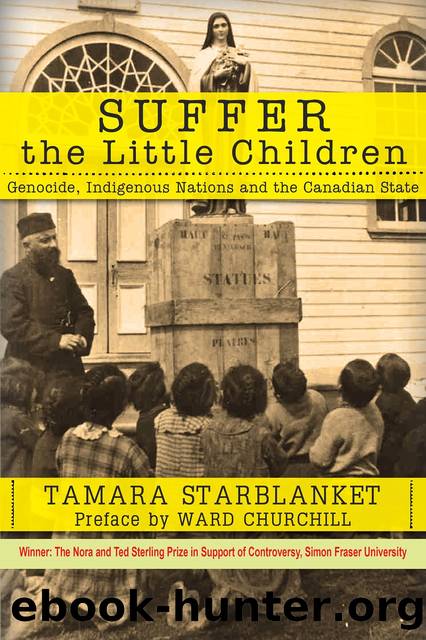Suffer the Little Children by Tamara Starblanket

Author:Tamara Starblanket
Language: eng
Format: epub
Publisher: Clarity Press
Published: 2018-03-15T00:00:00+00:00
Separating Rhetoric from Reality
The word game the state utilizes to separate its conduct from the horrific truth is imperative to absolving itself of criminal responsibility. The state and society, characteristic of domination, theft of our lands and our territories, and the forcible removal of our children, engage in denial by invoking benign rhetoric. With respect to the residential school, Chrisjohn, et al. explain âthe [s] tandard accountâ¦disposes neatly of all problems associated with Indian residential schooling.â52 While Canada has been involved in âofficial, longstanding continuing policyâ53 of genocide, there has also been a longstanding use of myths, ârhetoricâ or âeuphemismsâ that convey the residential schools as less than genocide.54 Euphemisms conceal from the public at large that the act of forcibly transferring Indigenous children from one group to another, with the intended destruction of that group, is an act of genocide in international law. Statements such as âinadequately fedâ show the reality of the serious bodily and mental harm experienced in the residential schools system through the classification of forced starvation. Concealing actuality through words even as the subject is discussed with apparent openness is one of the ways the oppressor upholds and can maintain its continued and on-going genocide against our Nations.
The forcible transfer of Indigenous children is not merely âprofoundly negative,â and therefore âwrong,â as Prime Minister Harper so blandly put it in his apology to former residential school students. âWrongâ is a far cry from âcriminal,â which, unlike âwrong,â implies the possibility of legal recourse and remedy, or indeed should raise questions as to why there has beenâcan beânone. Terms that characterize the harm as an âassault,â âneglect,â or âabuseâ do not capture the reality experienced by Indigenous children in the residential institutions.55 âWords have a history,â as Steven Newcomb observes. âWords from the past have the ability to colonize the present. Words shape and create reality.â56 Genocide is occluded by the use of words such as causing the âwoeful mistreatment, neglect and abuse of many childrenâ57 when the woeful mistreatment is more accurately depicted as torture, starvation, disease, forced labour, and endemic sexual predation.58 The term neglect implies that what happened was not even an action to which intent might be adduced, but a non-action, reinforcing the notion that it was accidental or not intended. Neglect projects a euphemistic inversion of the intent to destroy the Original Nations (national identities) by forcibly taking Indigenous children which is accurately termed in the UNGC as an act of genocide.
Similarly, terming the harm intended as based on the objective of assimilation59 rather than what the residential institutions were designed forâwhich was to disassemble or destroy Indigenous Nations as suchâalso minimizes the destruction experienced by Indigenous children. As Venne explains â[g]enocide is genocide, no matter what form it takes and no matter what you call it.â60 Calling an apple an orange will never make an apple an orange. So terming genocide as assimilation will never change the reality experienced by children and the effort to destroy national groups, meaning Indigenous Nations.
Download
This site does not store any files on its server. We only index and link to content provided by other sites. Please contact the content providers to delete copyright contents if any and email us, we'll remove relevant links or contents immediately.
| 19th Century | 20th Century |
| Exploration | First Nations |
| Founding | Pre-Confederation |
| Province & Local | War of 1812 |
Cat's cradle by Kurt Vonnegut(15339)
Pimp by Iceberg Slim(14489)
4 3 2 1: A Novel by Paul Auster(12377)
Underground: A Human History of the Worlds Beneath Our Feet by Will Hunt(12090)
The Radium Girls by Kate Moore(12019)
Wiseguy by Nicholas Pileggi(5771)
The Fire Next Time by James Baldwin(5432)
Perfect Rhythm by Jae(5398)
American History Stories, Volume III (Yesterday's Classics) by Pratt Mara L(5301)
Paper Towns by Green John(5181)
Pale Blue Dot by Carl Sagan(4996)
A Higher Loyalty: Truth, Lies, and Leadership by James Comey(4955)
The Mayflower and the Pilgrims' New World by Nathaniel Philbrick(4495)
The Doomsday Machine by Daniel Ellsberg(4485)
Killers of the Flower Moon: The Osage Murders and the Birth of the FBI by David Grann(4443)
The Sympathizer by Viet Thanh Nguyen(4385)
Too Much and Not the Mood by Durga Chew-Bose(4338)
The Borden Murders by Sarah Miller(4315)
Sticky Fingers by Joe Hagan(4189)
